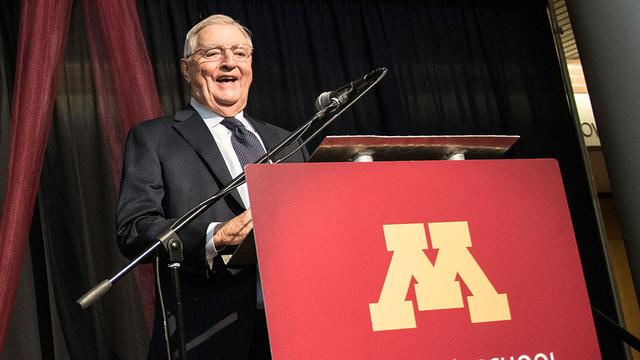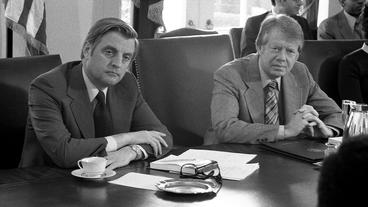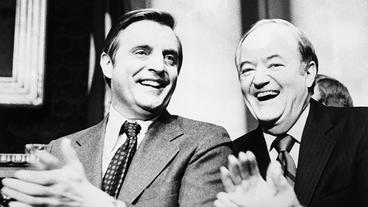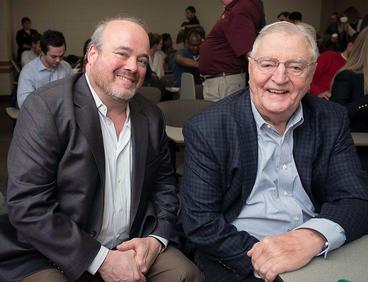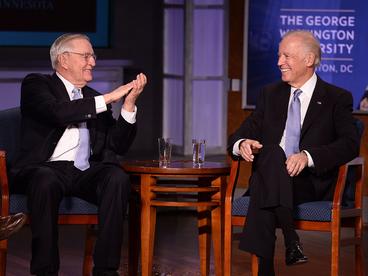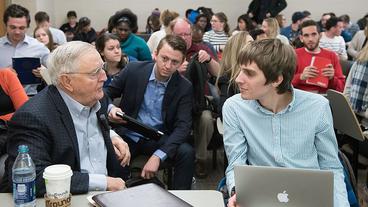Walter Mondale, a son of Minnesota who reached the heights of political power in the 1970s as the vice president of the United States, is being remembered for his distinguished career in public service and his longtime support of the University of Minnesota, including the Humphrey School of Public Affairs. Mondale died Monday evening at the age of 93.
Born in Ceylon, Minnesota, on January 5, 1928, and educated at Macalester College and the University of Minnesota, Walter Mondale served as Minnesota attorney general, U.S. senator, vice president, and U.S. ambassador to Japan. Most recently, he was senior counsel with the Dorsey & Whitney law firm in Minneapolis and a part-time instructor at the Humphrey School.
“Today, our hearts are heavy with a sense of loss, and yet we can’t help but celebrate the remarkable life of Walter Mondale, a man who was committed to making our nation and our world a better and more just place for everyone,” Dean Laura Bloomberg said. “During his time in public office, he led with compassion, he demanded justice, and he championed reform through bipartisan cooperation.”
Whether it was his landmark effort as Minnesota attorney general to ensure the right to counsel for indigent criminal defendants, his championing in the U.S. Senate of fair housing legislation, or his role in working to balance individual liberties and homeland security by holding intelligence agencies accountable, Mondale made enormous contributions to the strength and durability of our democratic institutions.
Political career
Mondale, a Democrat, served as Minnesota Attorney General from 1960 to 1964. He was appointed to the U.S. Senate upon the resignation of Sen. Hubert Humphrey following Humphrey's election as vice president in 1964. Mondale was elected to a full Senate term in 1966 and reelected in 1972.
He left the Senate after being elected vice president in 1976, as the running mate of Jimmy Carter.
From the start, Mondale had a different relationship with President Carter than past vice presidents. He revamped the role of the vice president, expanding it from merely a figurehead to presidential advisor and confidant. Mondale was the first vice president to have an office in the White House and began the tradition of weekly lunches with the president.
Mondale ran for president in 1984 and upended another tradition by naming a woman, U.S. Rep. Geraldine Ferraro of New York, as his running mate. They lost the election to Ronald Reagan and George H.W. Bush.
Mondale moved back to Minnesota to practice law at the Minneapolis- based firm of Dorsey & Whitney. He returned to public life in 1993, when President Bill Clinton appointed him ambassador to Japan. He served in that position for three years, returning to Minnesota in 1996.
His final political campaign was short and bittersweet: following the death of U.S. Sen. Paul Wellstone in a plane crash less than two weeks before Election Day in 2002, Mondale replaced Wellstone on the ballot but lost to Republican Norm Coleman.
Connections to the Humphrey School
Few, if any, individual public officials have played a more significant role in the life of the Humphrey School than Walter Mondale, in part because of his long friendship with Hubert Humphrey, also a Minnesota Democrat who served as a U.S. senator and vice president.
“We were very close, like father and son, especially in the early years,” Mondale said of Humphrey in a 2018 interview. “I started helping him and we kept it going for 50 years. We served in the Senate together. He served as vice president [1965-1969], and I served as vice president. Although we had different personalities, we were able to work together and did. The record that we established set the pace for reform—Medicare, Medicaid, quality education, environmental protection, the elements of modern progressive life—we were there working on those issues together.”
After Humphrey was diagnosed with terminal cancer in 1977, he consulted with a small group of friends, including Walter Mondale, about what kind of memorial he wanted as a remembrance of his public service.
“Hubert said, ‘I do not want a dead memorial. If there’s going to be a memorial with my name on it, I want it to be an educational institution where young people are learning—not just about the past, but about the future,’” Mondale said in 2018. “I think he’d be very happy with the Humphrey School. It’s a nationally ranked school, and it’s become a really dynamic, exciting part of the Minnesota educational scene.”
The University’s former School of Public Affairs was renamed the Humphrey Institute in 1977, shortly before Hubert Humphrey’s death in January 1978. Its name was changed to the Humphrey School of Public Affairs in 2011 to better reflect its academic mission.
Mondale supported and advocated for the Humphrey School in myriad ways over the years. He established the School’s highly regarded Policy Fellows Program, which recently marked its 30th year and boasts more than 800 former participants occupying positions of importance in government, nonprofits, and the private sector.
Mondale was a long-standing member of the Humphrey School Dean’s Advisory Council, and was one of the School’s most popular instructors.
For the last 15 years, he co-taught a class on the U.S. Constitution and national security with Humphrey School Professor Larry Jacobs. In addition, Mondale often joined Jacobs in hosting public programs on a range of political topics.
Jacobs holds the Walter F. and Joan Mondale Chair for Political Studies, and became close to Mondale over the years. He described Mondale as a source of inspiration and “my most influential professional mentor.”
“Teaching and co-hosting public programs with Mr. Mondale has been the pinnacle of my career,” Jacobs said. “His deep Democratic loyalties are not what has stood out to me. Rather, it's his unyielding curiosity to better understand public policies and see America achieve prosperity for all.”
Jacobs added that Mondale loved teaching Humphrey School students. "He was challenged and rewarded by their eagerness, enthusiasm, engagement, and hard questions about our challenges today. He told me once, 'Our students have kept me alive.'"
Mondale’s legacy
To honor Walter Mondale’s life and legacy of public service, the Humphrey School recognized him in 2015 with a Lifetime Achievement Award for Public Leadership and established the Walter F. Mondale Fellowship Fund, which subsequently raised $2.2 million for student scholarships.
The initiative to honor Mondale also included a celebration in Washington, DC, in October 2015, which included a half-day policy forum and a gala dinner. Among the participants was former president Jimmy Carter and Joe Biden, who was vice president at the time.
As a final and most public recognition of Mondale’s contributions to the School, in 2018 it renamed its main public gathering space the Joan and Walter Mondale Commons to honor the partnership of Mondale and his wife, who in many ways redefined the way political spouses approach public service.
Joan Mondale had a background in the arts, and became a successful artist in her own right, primarily in pottery and ceramics. While the Mondales lived in Washington, DC, she was active in the arts scene and served as honorary chair of the Federal Council on the Arts and Humanities.
After retiring from “official” public service, Joan and Walter Mondale continued their active involvement in the community—she by supporting artists and arts organizations, he by practicing law, championing progressive causes, and supporting higher education, especially at the University of Minnesota. Mrs. Mondale died in 2014.
“Humphrey and Mondale … [are] probably our two most famous individuals together,” said Eric Kaler, then president of the University of Minnesota, at the 2018 Mondale Commons dedication. “What great Americans, what great Minnesotans, and what great servants to our country these two have been. And now in the Humphrey School, named after our state’s and the university’s happiest warrior, we have this welcoming commons honoring Joan and Walter Mondale—the first couple of art, of diplomacy, of grace and civility.”
“Throughout his life in politics, Mr. Mondale was respected globally, and yet he always gave generously of his time and talent to his home state and to the University of Minnesota,” said Dean Bloomberg. “He leaves an indelible mark on our Humphrey School community. From the hundreds of students he inspired as a teaching professor to the student recipients of the Mondale Fellowship, he worked tirelessly to instill in students his passion for the common good and his fierce dedication to justice. The Humphrey School will always aspire to honor his legacy."
What will be Walter Mondale’s legacy? When asked that question in 2018, Mondale spoke again of his support for public service.
“I’d like to encourage young people to enjoy public service, but to prepare to fight” for what they believe in, he said. “You need to make your case, you need to get public support, get the public engaged. That’s the way progress is made. It’s hard, it’s tough, but it’s also fulfilling. That’s the biggest legacy that I would like to leave.”
“The Humphrey School is a most essential institution,” he added. “We confront really tough problems in our nation and around the world. The Humphrey School tries to tap the dynamics, the excitement, and the goodwill of students to get engaged in improving the quality of life, the fairness of life, the decency that should be there, the joy of public service, and I think it’s doing that. I’m very proud of the School, and if Hubert Humphrey were around, he’d be thrilled.”
Walter Mondale is survived by his sons, Ted and William, six grandchildren, and other relatives. In addition to his wife, Joan, he is preceded in death by his daughter, Eleanor, who died in 2011 of brain cancer.
The family has requested memorials in Walter Mondale's name be directed to several organizations he supported, including the Humphrey School. Please address checks to the University of Minnesota Foundation and mail to PO Box 860266, Minneapolis, MN 55486-0266. Or make a gift online to the Walter F. Mondale Fellowship Fund.
More resources:
